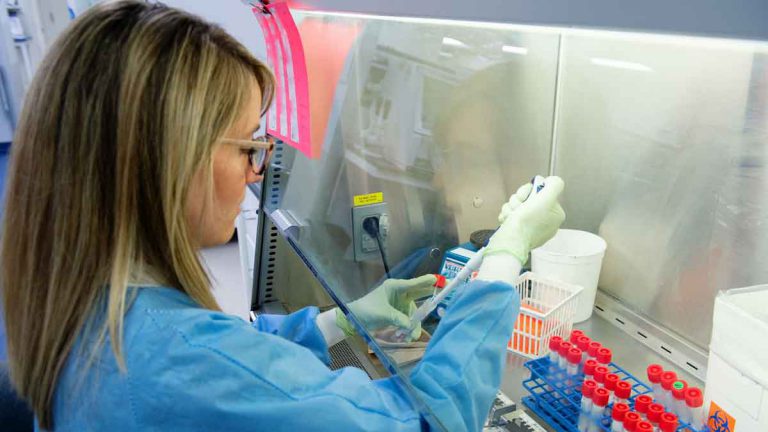URBANA – Carle Foundation Hospital in Urbana has joined a growing number of Illinois hospitals doing on-site testing for COVID-19.
But testing at Carle, like many other hospitals, will remain limited to patients who qualify based on criteria set by state health officials.
In mid-March, those criteria were broadened to include hospitalized patients with severe respiratory illness and people who live or work among vulnerable populations, including assisted living facilities, nursing homes, homeless shelters and correctional settings.
Despite the restrictions in who can get tested, as hospital labs get equipped to do their own testing, it means there will be a reduced burden on state and commercial labs and a faster turnaround time for results.
The Illinois Department of Public Health has three labs that have been conducting COVID-19 testing—in Chicago, Springfield and Carbondale. Some hospitals contract with commercial labs located out-of-state, which can delay results.
Now at least 16 hospital labs in Illinois are equipped for on-site testing, according to the most recent data from the state. But limited testing supplies are preventing many labs from ramping up to perform more widespread testing, says Dr. Robert Healy, Carle’s chief quality officer.
“The supplies are really the bottleneck,” Healy said in an interview on The 21st show. “So we’re working with the state, and with our vendors, to get as many supplies as we can.”
A hospital lab in Evanston that was among the first to start on-site testing earlier this month is experiencing the same issues, according to Dr. Karen Kaul, chair of the department of pathology and laboratory medicine at NorthShore University HealthSystem.
Kaul says she and her colleagues began working back in January to develop a test for COVID-19 after seeing the news coming out of Wuhan.
The process involved purchasing reagents and other supplies, as well as gathering information about the virus’ genetic composition and working with the Illinois Department of Public Health to get the testing protocol approved.
“And at the end of that preparation, our assay performed identically to the CDC assay (and) our results were the same as those obtained in the Illinois Department of Public Health lab,” Kaul says.
But Kaul says the labs at NorthShore, like many across the nation, are dealing with supply chain issues.
“It’s extremely frustrating,” Kaul says. “I mean, you name it, everything is running out… Suddenly, everyone in the world wants the same reagents and pipette tips and materials” to conduct COVID-19 testing.
Kaul says she’s aware of other hospital laboratories that have had to shut down testing temporarily because they had run out of a key component for testing.
The testing backlog is driven not just by the supply shortage, Kaul says, but by a lack of trained technologists with the right expertise who can perform the tests.
Kaul says she suspects the reason more hospital labs don’t have on-site testing yet is because it also “takes a fairly sophisticated laboratory” to pull it off, including the right equipment and enough technologists and lab scientists with the right expertise to perform the tests.
There are also bureaucratic hurdles and other technical challenges when it comes to validating testing protocols and getting FDA approval, she says.
Healy says it’s important to ramp up testing across Illinois and the nation to have a better sense of how COVID-19 is spreading and what the trajectory is.
On-site testing is also critical, Kaul says, to get answers to clinicians and patients quickly “so that people are managed appropriately in the hospital.”
Kaul says she believes a lack of coordination among public health labs, hospitals, and vendors is what has caused the delay in ramping up COVID-19 testing nationwide. But she says she’s optimistic the lessons learned through this experience will help the nation’s health system be better prepared in the future.
“We were all a little bit taken by surprise that this came in came so quickly,” Kaul says. “I think a bright spot I look toward is that this will teach us some lessons so that we are better prepared in the long-run to handle the next thing that might come at us.”
Follow Christine on Twitter: @CTHerman

